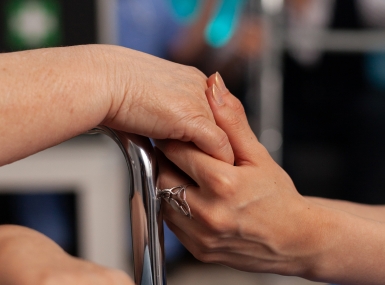FCC takes critical steps to improve the 988 National Suicide Lifeline
Author

Blaire Bryant

Naomi Freel
Upcoming Events
Related News

Key Takeaways
On March 21, bipartisan congressional leaders and Federal Communications Commission (FCC) Chairwoman Jessica Rosenworcel announced steps to improve the 988 National Suicide Lifeline. The FCC will issue a Notice of Proposed Rulemaking (NPRM) on georouting for 988, making the 988 Lifeline more accessible to residents and improve connections to local mental health services. This announcement marks major progress on the nation’s crisis response, a priority for counties and a key policy pillar of the NACo Commission on Mental Health and Wellbeing.
What was announced?
The FCC will propose a rule to improve 988 by routing calls based on callers' general physical location rather than their phone number's area code. It is important to note that as part of this proposed solution, the exact location of callers will not be provided to the 988 Lifeline to protect individuals’ privacy. The issue of 988 georouting has been a priority for the Bipartisan Senate Mental Health Caucus, co-founded by Sens. Alex Padilla (D-Calif.) and Thom Tillis (R-N.C.). Last year, following NACo’s advocacy on Capitol Hill and meetings with the FCC, Sens. Padilla and Tillis introduced the Local 988 Response Act of 2023 (S.4333), with a companion bill introduced by Rep. Tony Cárdenas, co-chair of the House 988 & Crisis Services Task Force.
Why is it needed?
Since launching in 2022, there have been over seven million calls to 988, making it an essential tool for counties in supporting the mental health of residents. Georouting refers to technical solutions that enable calls to be directed based on the location of the caller without transmitting the caller’s precise location information. These solutions would permit wireless calls to the 988 Lifeline to be directed to nearby crisis centers based on factors such as the cell tower that originated the call rather than the area code of the wireless device used to place the call. This system would maintain any privacy requirements carriers may have about the nature of such sensitive calls. Routing calls based on the caller's geographical proximity rather than using the caller’s area code, ensures a quicker response from mental health professionals.
What is the impact on counties?
Counties are responsible for providing a robust behavioral health care continuum. By connecting callers directly to the nearest call center, counties can prioritize prompt and secure care while protecting user privacy. In June 2023, NACo met with the FCC to emphasize that georouting calls to 988, meaning directing calls based on a caller’s location rather than their phone’s area code, would enable counties better to support the needs of those callers.
What are the next steps?
The NPRM was circulated to the full Federal Communications Commission following yesterday’s announcement. If adopted by the full Commission, the NPRM will open for public comment before a final rule will be released. NACo will solicit thoughts from members on local needs for implementation of the final rule, and will continue to provide updates on this rule as it progresses through the rulemaking process.
Related News

California counties fight agricultural crime
Sheriffs' offices and prosecutors in California's central valley make specific efforts to prevent and prosecute crimes against the agricultural community.

After historic winter storms, counties assess response
Counties in states that rarely receive much winter weather are assessing their responses to the January storm that left many covered in snow and ice.

DHS funding set to lapse, putting key county partners at risk of a partial shutdown
The U.S. Department of Homeland Security (DHS) is headed toward a funding lapse at 12:01 a.m. ET on Feb. 14 after the Senate failed this week to advance legislation to fund DHS for the remainder of Fiscal year (FY) 2026.


